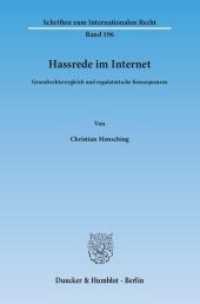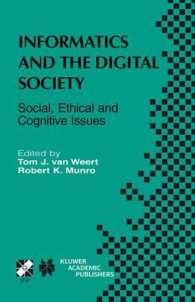- ホーム
- > 洋書
- > 英文書
- > Religion / Ethics
Full Description
Our relationship to future generations raises fundamental issues for ethical thought, to which a Christian theological response is both possible and significant. A relationship to future generations is implicitly central to many of today's most public controversies - over environmental protection, genetic research, and the purpose of education, to name but a few; but it has received little explicit or extended consideration. In Living for the Future Rachel Muers argues and seeks to demonstrate that to consider future generations as ethically significant is not simply to extend an existing ethical framework, but to rethink how ethics is done. Doing intergenerationally responsible theology and ethics means paying attention to how people are formed as theological and ethical reasoners (reasoners about the good), how social practices of deliberation about the good are maintained and developed, and how all of this relates to an understanding of the world as the sphere of God's transforming action. In other words, an intergenerationally responsible theological ethics will pay attention to the ethics, and the spirituality, of "ethics" itself.
Her account of the ethical relation to future generations centres on three key concepts: "choosing life" (see Deut 30:19); "keeping the sources open"; and "sustaining fruitful contexts. These concepts are developed theologically and in engagement with extra-theological conversations on intergenerational responsibility. She shows how they take up and move beyond concerns expressed in those conversations - for "survival", for the right distribution of resources, and for the maintenance of human values.
Contents
Introduction: The question of future generations; Chapter 1: Absent generations and the presence of God; Chapter 2: Intergenerational covenants; Chapter 3: Being called into communities; Chapter 4 Turning away from idols; Chapter 5: Who am I for future generations? (1) Being in someone else's place; Chapter 6: Who am I for future generations? (2) Mothering the future; Chapter 7: Sustainable thinking; Chapter 8: Passing on the genes; Chapter 9: Conclusion








